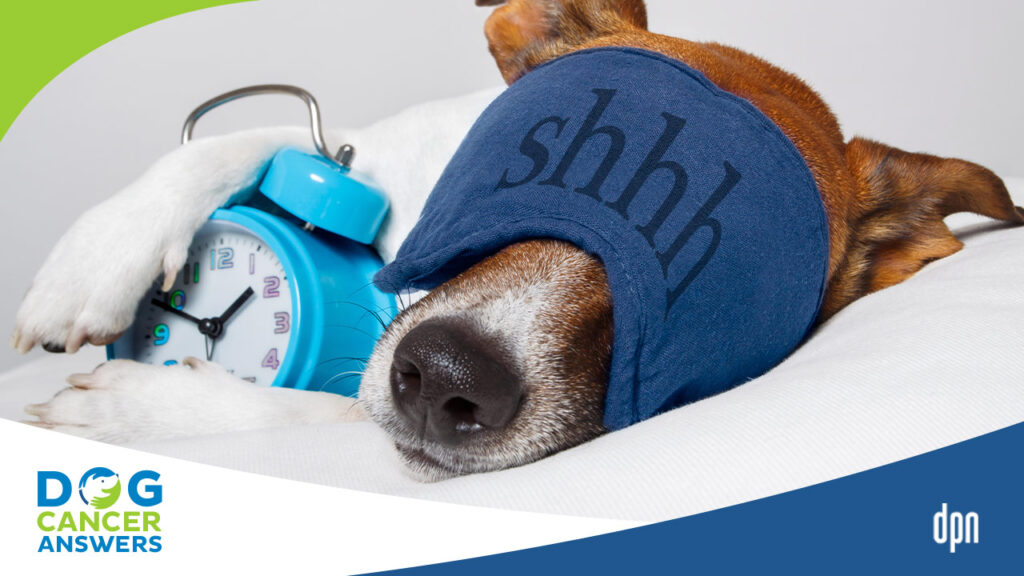Melatonin is a naturally occurring hormone produced at night that has promising lines of evidence for its ability to help fight cancer.
Key Takeaways
- How much melatonin you can give your dog depends on her size, age, and health conditions. Doses given to dogs are usually between 1mg and 6mg.
- Dogs may fall asleep with melatonin, but usually it just promotes a normal sleep schedule.
- You can give your dog human melatonin gummies if all of the ingredients are safe for dogs. Don’t forget to check the inactive ingredients, which may include the extremely toxic artificial sweetener xylitol.
- Melatonin lasts about 24 hours in dogs.
What Is Melatonin?
Dogs produce melatonin, a beneficial hormone, naturally. It’s primarily produced at night by the pineal gland located towards the back of your dog’s brain.1
Your veterinarian might recommend melatonin to help with several conditions, including stress, separation anxiety, phobias, and cancer.
Sleep Patterns Influence Melatonin
The levels of melatonin in healthy dogs depend on their daily and seasonal circadian (sleep) cycle.2
For example, melatonin production is at its highest during autumn and winter nights when your dog’s sleep is at its deepest, typically in the very early morning hours between midnight to 2:00AM.3
Let’s take a look at what the research says about melatonin and cancer in particular. We’ll start with human cancer, and then review what we know in dogs.
Evidence for Using Melatonin Against Cancer
Research suggests that melatonin acts on several pathways that reduce how well cancer cells grow and spread. It has also been shown to have antioxidant and anti-inflammatory activity.5
This has been widely shown in cells studied in the laboratory in vitro harvested from abnormal mammary tumor growths.
Human Cancer Trials
While in vivo (in living body) studies on dogs are lacking, some studies have been able to show a link between cancer and melatonin in humans. For example, patients with colorectal carcinoma had significantly lower levels of melatonin production at night compared to healthy, cancer-free individuals.6
Other results with different cancer types have been mixed. One review study examining the circadian rhythm of melatonin secretion in breast cancer patients found that while some research reported high levels of melatonin at night and low levels during the day in breast cancer patients, others reported a reduced peak in melatonin produced at night and an overall lower range of melatonin levels recorded throughout the patient’s daily circadian cycle.7
Clinical trials involving human subjects have provided striking evidence for the overall anticancer benefits of melatonin when combined with conventional treatments like chemotherapy. Data reflective of higher survival rates, reduced reports of negative side effects, faster tumor regression, and other metrics related to therapeutic efficacy suggest that melatonin can benefit a wide range of cancers being treated.5
One study investigating the effects of melatonin on patients receiving chemotherapy for lung cancer found that 20 mg of melatonin per day increased both tumor regression rates and 5-year survival rates.8
Now, let’s look at the studies that have been done in dogs so far.
Canine Mammary Cancer
Studies suggest melatonin may help treat mammary cancer in dogs.
When researchers noticed that the oral consumption of melatonin appeared to stop the spread of mammary cancer in female dogs, they investigated the interaction of melatonin with estrogen receptors.
This study found that while melatonin decreased cancer cell viability and proliferation in both tumors with estrogen and those without, the result was greater for female dogs whose tumors did have estrogen, showing a potential link between the two.3
Another study investigated a special subset of canine mammary carcinoma cells that are “unanchored.”
Melatonin may be a valuable asset in treating mammary cancer in dogs.
These cells are particularly difficult to treat due to their resistance to conventional cancer therapies and migration ability, often making them responsible for tumor reoccurrence. Remarkably, the study’s authors found a significant decrease in cell viability and movement when the dogs were treated with melatonin.4
Another study observed that the development and spread of mammary cancer in dogs often involves the movement of asymmetrical epithelial (skin) cells that have lost the ability to adhere to other cells. This is called the Epithelial-Mesenchymal Transition, and it is activated by Transforming Growth Factor beta (TGF-β).
TGF-β is a small protein that plays a wide-ranging role in cell signaling and tells cells when and where to divide. Previous work suggests that melatonin as a hormone appears to participate in and influence the TGF-β pathway. To investigate this further, researchers treated a canine mammary cell line with melatonin and examined cell migration. Results confirmed that melatonin acts on the TGF-β pathway and can reduce the spread of mammary cancer cells.9
Together, these studies suggest that melatonin may be a valuable asset in treating mammary cancer in dogs.
Mammary gland cancers are one type that can benefit from melatonin. Learn about mammary cancer in this episode of Dog Cancer Answers.
Mast Cell Tumors
The impacts of melatonin have also been studied in mast cell tumors. One study examined eight live dogs diagnosed with mastocytoma that had not spread to other parts of their bodies.10
- The researchers combined melatonin with another supplement called delta tocotrienol, commonly used to disrupt the cell cycle of parasites.
- The dogs were treated with 4 mg of melatonin and 150 mg of delta tocotrienol two times a day, five days a week, for a total of three months.
- Seven of the eight dogs had their tumors surgically removed prior to this treatment, and only one had a cancer relapse.
- In addition, the tumor nodules that could not be removed due to their location either disappeared or significantly reduced in size.
Melatonin Boosting Tips
The nice thing about melatonin is dogs produce it naturally, and you can boost your dog’s natural melatonin production by focusing on their sleep issues and sleep patterns. This helps pet parents avoid potential side effects from medications and supplements.
Try one or more of the following:2
- providing sleeping spaces that are dark and fully enclosed
- covering windows with blackout curtains or shades in the room your dog rests in
- removing all sources of “blue light” that may emit from TV, phone, computer, or tablet screens
- unplugging nightlights
- charging devices distantly from where your dog sleeps to avoid the omittance of any potentially interfering electrical fields
You can also supplement your dog’s diet with foods that contain melatonin, such as eggs and fish.4
These methods are all pretty safe to do without taking to your veterinarian. But if think your dog could benefit from more melatonin, talk to your veterinarian about a supplement.
Do Dogs Need a Melatonin Supplement?
Adding a melatonin supplement to your dog’s regimen can provide many benefits, particularly in helping support their fight against cancer.
There are many commercial over-the-counter melatonin supplements, prescription prolonged-release formulas, and an implant.
Melatonin is a powerful hormone generated while dogs sleep in complete darkness. This episode of Dog Cancer Answers covers ways to boost your dog's melatonin levels.
Common Uses of Melatonin
The benefits of melatonin have been well observed in canines, and it’s become a widely accepted treatment in integrative veterinary medicine. Much of the literature surrounding the potential efficacy of melatonin in dogs focuses on canine mammary carcinoma.9, 10, 11
However, this doesn’t mean that melatonin can’t be helpful with other cancer types, including mast cell tumors.10
Like most cancer-related research, the majority of studies involve human patients. However, many of these can be applied to canines, and human studies are nonetheless often relevant and helpful indicators of use and efficacy.
Melatonin has exhibited helpful benefits to human patients across several different types of cancer, including ovarian, cervical, endometrial, liver, renal, gastric, pancreatic, prostate, colorectal cancer, oral cancer, and melanoma.5,12-14
Adjunct Therapy
Consistently, regardless of cancer type, the benefits of melatonin as an adjuvant therapy are resounding. Melatonin has been shown to:5,13,15,16
- protect against the toxicity of chemotherapy and radiotherapy
- decrease drug resistance
- induce apoptosis (natural cell death)
- improve the overall quality of life while receiving treatment
- help counteract the adverse effects of chemotherapy on cognitive function and performance
- improve quality of sleep
- mitigate symptoms of depression
Hospice Care
Melatonin may also help dogs nearing the end of their lives and experiencing negative side effects associated with later-stage cancer, such as weight loss.17
Broadly, it can promote better sleep in any dog, regardless of their cancer status or risk. It is also used to treat alopecia,18 or hair loss not caused by allergies, and symptoms associated with canine cognitive disorder, such as anxiety.19
Safety and Side Effects
Overall melatonin is extremely well-tolerated.10 As with any oral supplement, your dog may experience digestive upset that could lead to vomiting or diarrhea. Allergic reactions may also occur and can vary in severity.18 You will likely observe sleepiness soon after administration.18
Human Grade Melatonin
It is safe to give human-grade melatonin supplements to your dog. These products are typically held to stricter manufacturing standards than pet-grade supplements and may be safer. However, always check the inactive ingredients for xylitol or birch sugar – this sweetener is sometimes added to flavored or chewable human products (including gummies) but is extremely toxic to dogs.2,21
How Long Melatonin Lasts
Melatonin will stay in your dog’s system for approximately 24 hours,18 so short time side effects will likely not last more than a day. Longer-term effects may include weight gain or changes in fertility.18 Changes in behavior or coat quality may also occur.18
It is always best to observe your dog closely the first few times you give melatonin. Be sure to call your veterinarian or visit your nearest emergency vet immediately if significant adverse reactions occur.18
Melatonin Interactions
Melatonin is likely safe to use with most other supplements and has been tested in conjunction with other compounds in previous research studies.6
Even though melatonin supplements are available over the counter, you should still consult your veterinarian before adding it to your dog’s regimen and ensure it is safe to use with their current treatment plan.18
Melatonin with Chemotherapy
Melatonin was found safe to use with chemotherapy in studies involving humans and is a promising adjuvant therapy. 5, 12, 15 There is evidence that melatonin, combined with chemotherapy, has synergistic properties that resolve drug resistance and fight tumor progression.21
One of the reasons that drug resistance develops in cancer cells is because of genetic mutations that allow cells to better resist chemotherapeutic drugs. Interestingly, melatonin has been found to correct these alterations, ultimately improving how well the treatments work.
Some precautions will need to be taken with some chemotherapy agents, and cancer-type-specific therapies will likely be necessary for maximum efficacy.21
When to Not Use Melatonin for Dogs
While melatonin is largely safe, there are a few cases in which you should exercise caution:
- If your dog is taking immunosuppressive drugs, including steroids2
- If your dog takes anticoagulants or anti-platelet medications2
- If your dog takes fluoxetine (Prozac®)22
- Diabetics – melatonin may influence the amount of insulin they need2
- Epilepsy2
- Chemotherapy drugs in conjunction with melatonin is not well studied in dogs as it is in humans, so it’s best to discuss in detail with your veterinarian if your dog is receiving chemo before introducing melatonin.
As with most supplements, be wary of using melatonin with dogs that are pregnant or nursing, and discontinue use if any allergic reactions occur.18
Melatonin is just one of the supplements that can benefit dogs with cancer. Dr. Dressler, author of The Dog Cancer Survival Guide, discusses the supplements worth considering and how they work in this episode of Dog Cancer Answers.
Where to Buy Melatonin for Dogs at Home
Melatonin is relatively inexpensive and widely available in varying forms. Melatonin can come in a solid tablet, capsule, or liquid, depending on type and brand.18 As with any oral supplement, you can give it to your dog with a bit of food to help prevent digestive upset.
If administered by your veterinarian in a hospital setting, melatonin may be given as an implant under your dog’s skin.18
Melatonin is linked to your dog’s natural circadian rhythm, an important part of his overall biological function. Giving it to your dog at night is best to promote a normal sleep schedule.
The melatonin dosage varies based on your dog’s weight, health condition, and any other medications and supplements he is receiving. Doses are typically between 1 and 6mg but will vary depending upon the case.2, 23
Best Melatonin for Dogs
Dogs can take melatonin products intended for dogs or humans. Many products exist, so if your dog dislikes one, try something different.
Always check human products for xylitol (also called birch sugar). This sweetener is extremely toxic to dogs.
What If I Miss a Dose?
It’s okay to miss a dose every once in a while. If you remember soon after, then you can give the dose to your dog at that time. However, if enough time has passed that your dog is close to receiving their next dose, skip the dose you missed and return to your regular dosing schedule. Never double-dose your dog or give extra doses.18
Storage and Handling
Unless product instructions state otherwise, store at room temperature away from exposure to light and in an air-tight container.18
Our Take on Melatonin for Dogs
Given its potential, melatonin appears to be a highly underrated, understudied, and undervalued supplement. It’s high availability and low cost make it an accessible addition to your dog’s treatment plan. Be mindful when selecting a brand, with human-grade supplements preferred over pet-grade.
Research surrounding melatonin’s effects on dogs and dog cancer are limited, but shouldn’t necessarily deter you from considering it and consulting with your veterinarian. It may be just what your dog needs to sleep well and support his fight against cancer.
- Masters A, Seithikurippu R, Seixas A, Girardin JL, McFarlane SI. Melatonin, the hormone of darkness: From sleep promotion to ebola treatment. Brain Disorders & Therapy. 2015;04(01). doi:10.4172/2168-975x.1000151
- Jordan P. Melatonin for dogs: More than just a good night’s sleep. Dogs Naturally. https://www.dogsnaturallymagazine.com/melatonin-for-dogs-health-benefits/. Published June 9, 2022. Accessed December 11, 2022.
- Serrano C, Guzmán S, Arias JI, Torres CT. Melatonin decreases in vitro viability and migration of spheres derived from CF41.Mg canine mammary carcinoma cells. BMC Vet Res. 2019;15(1):390.
- Meng X, Li Y, Li S, et al. Dietary sources and bioactivities of Melatonin. Nutrients. 2017;9(4):367. doi:10.3390/nu9040367
- Li Y, Li S, Zhou Y, et al. Melatonin for the prevention and treatment of cancer. Oncotarget 2017;8(24):39896-39921.
- Khoory R, Stemme D. Plasma melatonin levels in patients suffering from colorectal carcinoma. J Pineal Res. 1988;5(3):251-258. doi:10.1111/j.1600-079x.1988.tb00651.x
- Ahabrach H, El Mlili N, Errami M, Cauli O. Circadian Rhythm and Concentration of Melatonin in Breast Cancer Patients. Endocr Metab Immune Disord Drug Targets. 2021;21(10):1869-1881. doi:10.2174/1871530320666201201110807
- Lissoni P, Chilelli M, Villa S, Cerizza L, Tancini G. Five years survival in metastatic non-small cell lung cancer patients treated with chemotherapy alone or chemotherapy and melatonin: A randomized trial. J Pineal Res 2003; 35:12-15.
- Custódio PR, Colombo J, Ventura FV, Castro TB, Zuccari DAPC. Melatonin treatment combined with TFG-β silencing inhibits epithelial-mesenchymal transition in CF41 canine mammary cancer cell line. Anticancer Agents Med Chem. 2020;20:989-997.
- Olivieri F. Delta tocotrienol and melatonin in management of mast cell canine tumor. Biomed J Sci Tech Res. 2020;28(4):218210-21821.
- Lopes JR, Maschio LB, Jardin-Perassi BV, et al. Evaluation of melatonin treatment in primary culture canine mammary tumors. Oncol Rep. 2015;33(1):311-319.
- Capote-Mareno A, Ramos E, Egea J, López-Muñoz F, Gil-Martín E, Romero A. Potential of melatonin as adjuvant therapy of oral cancer in the era of epigenomics. Cancers 2019:11;1712.
- Pourhanifeh MH, Mahdavinia M, Reiter RJ, Asemi Z. Potential use of melatonin in skin cancer treatment: A review of current biological evidence. J Cell Physiol 2019;DOI:10.1002/jcp.28129.
- Hagström A, Kal Omar R, Williams PA, Stålhammar G. The rationale for treating uveal melanoma with adjuvant melatonin: a review of the literature. BMC Cancer. 2022;22(1):398.
- Mortezaee K, Najafi M, Farhood B, Ahmadi A, Potes Y, Shabeeb D, Musa AE. Modulation of apoptosis by melatonin for improving cancer treatment efficiency: an updated review. Life Sci 2019;228:228-241.
- Palmer ACS, Zortea M, Soua A, et al. Clinical impact of melatonin on breast cancer patients undergoing chemotherapy; effects on cognition, sleep and depressive symptoms: a randomized, double-blind placebo-controlled trial. PLoS ONE 2020;15(4):e0231379.
- Lissoni P, Paolarossi F, Tanchini G, et al. Is there a role for melatonin in the treatment of neoplastic cachexia. Eur J Cancer. 1996; 32A(8):1340-1343.
- Gollakner R. Melatonin. VCA Animal Hospitals. https://vcahospitals.com/know-your-pet/melatonin. 2022. Accessed November 17, 2022.
- Buzby J. Canine cognitive dysfunction in dogs: signs, symptoms, solutions. Dr. Buzbys ToeGrips Dog Nail Grips. https://toegrips.com/canine-cognitive-dysfunction-in-dogs-signs-solutions/. Published September 27, 2021. Accessed December 22, 2022.
- FDA. Paws off xylitol; it’s dangerous for dogs. U.S. Food and Drug Administration. https://www.fda.gov/consumers/consumer-updates/paws-xylitol-its-dangerous-dogs. Published July 7, 2021. Accessed December 11, 2022.
- Najafi M, Salehi E, Farhood B, et al. Adjuvant chemotherapy with melatonin for targeting human cancers: A review. J Cell Phys 2018; 234:2356-2372.
- Fluoxetine and melatonin interactions. Drugs.com. https://www.drugs.com/drug-interactions/fluoxetine-with-melatonin-1115-0-1548-0.html. Accessed December 11, 2022.
- LaRock A. Melatonin dosage for Dogs Calculator and chart: How much to provide. Emergency Vets USA. https://emergencyvetsusa.com/melatonin-dosage-for-dogs-calculator/. Published December 2, 2021. Accessed December 11, 2022.
Topics
Did You Find This Helpful? Share It with Your Pack!
Use the buttons to share what you learned on social media, download a PDF, print this out, or email it to your veterinarian.









